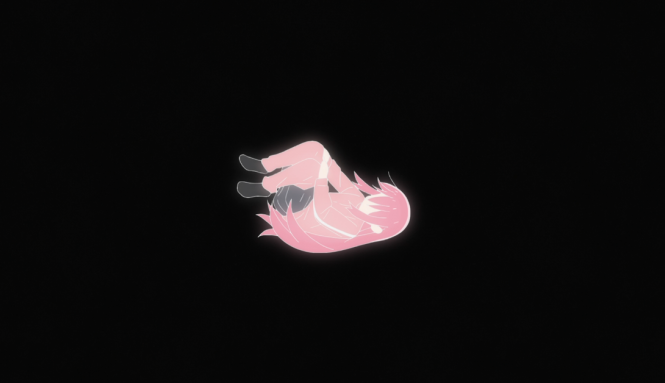Something I’ve been considering almost since the start of Bocchi the Rock! is the central source of the show’s comedy and how that intersects with a compassionate understanding of mental health. Whenever you have a story that wants to mine a character’s struggles (in whatever form) for laughs, inevitably it raises the question of whether the humor is coming from a place of understanding or cruelty.
And thus, the question: Is Bocchi the Rock! mean to Bocchi?
I’ll start off by saying, I don’t think so. While the reality is that Bocchi probably needs counseling more than she needs the affirmation of a random girl on the street cheering Ganbare!, proposing professional mental health care as the solution to Bocchi’s social anxiety just isn’t going to happen. In that equation, this story doesn’t exist. And Bocchi’s not alone in that. Shinji doesn’t get a therapist in Evangelion, Max and Milia don’t find an LMFT to fix their relationship for Mylene’s sake in Macross 7, and no social worker sweeps in to save the kids in Iron-Blooded Orphans.
This, though, raises another question. If, given Bocchi’s real-life setting, it’s clear that professional help is what Hitori-chan needs, is the show wrong to propose the band milieu as a crucible-cum-cradle for her slow but undeniable growth? Said another way, is it fair for the show to ask Bocchi to be roped into a street performance by a drunk indie bassist in order to reach the realization that she has no enemies?
This, I think, is a fairly complex question at the intersection of how we think about mental health and mental health treatment, about stories and storytelling, about responsibility and freedom. We are contacting the intersection between reality and fiction, between concerns for how real people are treated and how stories work. Lean all the way into reality, and you’d say that it’s cruel and unusual to force a socially anxious person like Hitori Gotoh into such a situation. Lean all that way into fiction, and you’d say worrying about Hitori Gotoh’s mental health is ridiculous because she is not, well, real.
But Bocchi the Rock! doesn’t exist in a vacuum. We live in a world where real people have real needs and struggle with social anxiety. I wouldn’t go so far as to say that laughing at Bocchi’s flailing is the same as laughing at real people who experience challenges similar to hers, but it certainly is fair to wonder where the line is. In high school, our theater director often told us that “comedy=tragedy plus time,” and in a show that somberly lingers on Bocchi’s various breakdowns instead of whipping through them at pace, we’d be reflecting on her emotional realities rather than giggling at her elastic faces.
All this is to say that Bocchi the Rock! can’t help but contact a sensitive subject, and therefore it’s valid to question whether the way it handles that material is kind or not.
Now, one way to assess this in a highly serious manner is to consider Bocchi as if she were a real person and not a cartoon character. I’m not a mental health professional, but I have done extensive research on the topic, co-authored a book with a clinical psychologist on mental health, and had hands-on experience with people going through various mental health crises. From that perspective, Bocchi to me doesn’t appear to be a person whose mental health issues are life-destroying (disclaimer: this is not a clinical diagnosis). Although her social anxiety has a clear impact on her life, she’s still able to eat, go to school, pursue hobbies she enjoys, and has a positive support structure in the form of her family (and, increasingly, her new friends).
In addition, Bocchi has both a clear desire to change her situation and overcome her social anxiety as well as the capacity to do so (even if its difficult for her). This isn’t to downplay her struggles, but simply to point out that Bocchi’s mental health issues aren’t all encompassing. They may define her life to a great degree, but they don’t entirely dominate it. Would Bocchi benefit from a counselor? Definitely. Is Bocchi incapable of overcoming her issues without professional help? I don’t think so.
And that, to me, is one of the keys that allows Bocchi the Rock! to function without coming across as mean-spirited toward our track-suited rocker girl. If Hitori Gotoh was genuinely unable to make changes to her life through her own efforts, then forcing her to confront her fears would completely unkind. Asking her to do things she simply cannot do and then holding up her failures as laughable would be mean. But Bocchi-chan is capable, if not exactly efficient, and the show is very clearly out to provide her with ample opportunity to succeed—even if achieving that success is hard.
The other thing working in Bocchi the Rock!’s favor is that Bocchi herself is very much aware of her own absurdities. She’s of course self-conscious to an often self-sabotaging degree, but her willingness to riff on herself in both her own thoughts and other ways (silly acoustic tracks, for example) indicate that even Bocchi sees the comedy in her own behavior at times.
But for me, the most important thing is that the show undeniably cares about Bocchi. Despite all the comedy the show mines from her behavior, what ultimately keeps the show going is her small but steady steps toward becoming a more functional, fulfilled person. Bocchi putting her foot down while playing the audition is a triumph because she decides to commit to changing herself for the sake of the band. Bocchi realizing the people outside of her own head aren’t scary enemies is depicted in shimmering lights, another triumph of present Bocchi over the Bocchi of the past. It’s abundantly clear that Bocchi the Rock! wants the viewer to celebrate her success with her.
So, no, I don’t think Bocchi the Rock! is mean to Bocchi. I think it sets out a particular portrait of a young woman who is struggling, but neither hopeless nor helpless. I think it uses comedy to portray her struggles in a way that facilitates great humor and great compassion side by side. You can’t help but love Bocchi, just as you can’t help but root for her.
–postscript–
By the way, another element of all this that didn’t really fit into the rest of the discussion is the question of how seriously, or perhaps how literally, we interpret comedy. As I see it, Bocchi the Rock! deliberately exaggerates (often visually) Bocchi’s mental state and reactions for the sake of humor. Bocchi ends up on the floor quite a lot, but I don’t think that means we’re supposed to believe that Bocchi is constantly collapsing and glitching out on the sidewalk.
In a way, it’s the same sort of thing as a tsundere girl punching out her dense love interest. I’ve always been a little baffled by people who claim this kind of cartoonishly exaggerated expression of character promotes abuse in romantic relationships. While I understand people being uncomfortable with it (just as I can understand someone being uncomfortable with Bocchi’s portrayal of social anxiety), I don’t think it makes interpretive sense to treat these kinds of abstractions as the show’s reality. When Chitoge winds up a ball of fire to punch Raku in Nisekoi, that’s obviously not meant to be taken as literally happening. The same effect happens, just to a lesser degree, with a less fantastical punch.
Likewise, I think, it is with the innumerable, creative ways the animators depict Bocchi-chan. More on the craft of all that on Sakugablog.
–discussion–
After saying all this, I’d like to note that I’m not someone who has really dealt with social anxiety in my own life—and certainly not to the extent that Bocchi experiences it. So while I can share my thoughts, ultimately I think it’s more important to hear from people who relate more to her (I relate much more to Ryou’s lone wolf lifestyle than Bocchi’s anxieties). So, if Bocchi’s social anxiety is something you’ve experiencde, what are your thoughts?Is it relatable? Cathartic? Offensive? Uncomfortable? Maybe a mix? If you’re comfortable doing so, feel free to comment below with your own thoughts!




